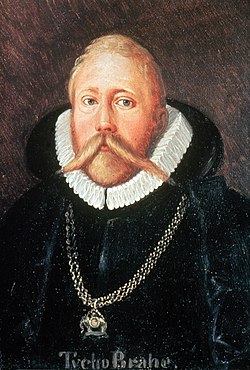By way of Instapundit, I found this interesting article from the New York Times by John Tierney, about a mystery concerning the death in 1601 of the astronomer Tycho Brahe. Analysis of Tycho’s hair after his grave was opened indicates mercury poisoning as the possible cause of death.
“Who’s Tycho Brahe?” you ask. What do they teach them in these schools?
Most people’s choice for an astronomer with a dramatic life would be Galileo, because of all his disputes with the Church. But in terms of sheer drama and bombast, the life of Tycho Brahe of Denmark has Galileo’s beat by light years. He fought duels! He had a fake nose! He kept a pet dwarf and a moose!
Born to a noble family and educated to be a civil servant, Tycho developed a passion for astronomy, and managed to get royal support for his research. At one point he was said to control one percent of the entire wealth of Denmark. The king gave him an island to rule, on which he built an observatory, which he later replaced with a second facility, in order to get better observations.
But when his patron King Frederick II died, the new king, Christian IV, withdrew his support. Tycho relocated to Prague and spent the rest of his life in the service of the Holy Roman Emperor.
Tycho rejected the Copernican Theorem, instead promoting a complicated one of his own devising, less shocking to traditional sensibilities. Nevertheless, his astronomical measurements set a new benchmark for scientific observation, and he conclusively discredited the old theory of celestial spheres, in which stars and planets had been supposed to move. After his death, his assistant Kepler absconded with his notes, which he kept for some time and made use of in his own work.
Anyway, the Times article speculates on the possibilities of an “Amadeus-” style movie about Tycho’s death.
Naturally, the scientists analyzing Brahe’s remains are steering clear of all this gossip, including the claim that Brahe had an affair with the Danish queen that helped inspire “Hamlet.” The archaeologist leading the team cautions that even if they confirm suspicions that Brahe was poisoned by mercury, that wouldn’t necessarily prove he was murdered, much less identify the killer.
Typical scientists. Fortunately for Tycho and Kepler, Hollywood has never let a lack of data get in the way of a plot. There’s no evidence that Antonio Salieri poisoned Mozart, and look what the movie “Amadeus” did for their album sales. The only difficulty for a screenwriter would be choosing an assassin from the competing candidates (and deciding between scholars’ Latin pronunciation of “Tee-ko” or the “Tye-ko” popularly applied to the lunar crater named after him). The movie would open, of course, with the duel in 1566 that cost the 20-year-old Tycho a good chunk of his nose (a sword fight possibly precipitated by an argument over mathematics, or maybe a mistaken astrological prediction by Tycho). Before long Tycho has a metal nose as well as an island with a castle and an observatory, financed by the king of Denmark and equipped with the most precise instruments yet built for tracking the planets and stars.
Worth reading.


I’m probably the only kid on the block who wants this movie done just so someone builds a working replica of Uraniborg, his observatory. What I really want to see is a docudrama that shows an actor demonstrating how Tycho made his observations and measurements. I suppose everyone else would be bored stiff.
Oops, I forgot to mention that he either was killed by aliens, or just simply broke too many of the earliest spiral light bulbs.
I’ve heard of Kepler before, but not Tycho. That seems to be the way of history – the bland, easily molded & manipulated information gets remembered, the more interesting story remains hidden.
I remember Tycho’s name, but that’s about it. I remember Kepler’s name too and that he was a believer and something about elliptical orbits.
Mercury poisoning?
He may have been taking a VD treatment.
Sounds like a possibility.
Here’s the song that says it all:
http://www.youtube.com/watch?v=6iiJMgUlIR8
Numberless are the variations of St. James Infirmary.